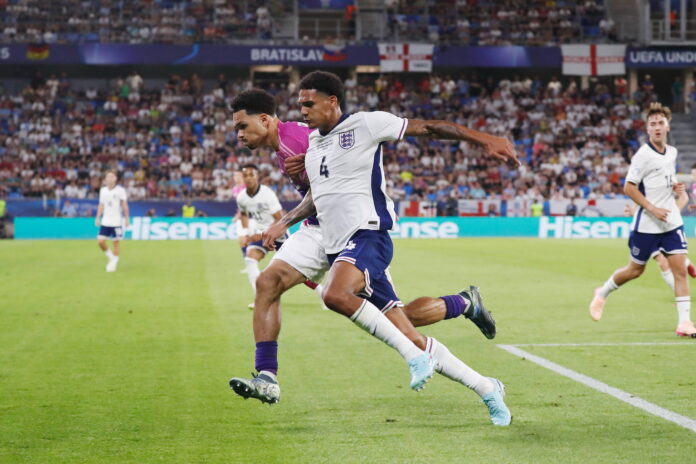Are the Reds Right to Sell Their £100m England Stars?
As Liverpool undergoes a quiet but ruthless transformation under Arne Slot, the emergence of England’s triumphant U21 cohort has only amplified the conundrum facing the club’s executive leaders, Michael Edwards and Richard Hughes. With three young Reds having played prominent roles in England’s European Championship win this summer, one has already left, one is reportedly close, and one may soon follow. Together, Jarell Quansah, Harvey Elliott, and Tyler Morton could bring in around £100 million in transfer revenue — a staggering figure for players who, for varying reasons, have yet to fully embed themselves into Liverpool’s starting XI under Arne Slot. But the plan is layered, and the exits may not be as permanent as they seem, however, they’re departures do appear to be given the green light by the Premier League-winning head coach.
The Reds Sporting CEO, Michael Edwards, and his Sporting Director, Richard Hughes, have shown early signs of combining proactivity with unrelenting ambition. In each case, the possibility of future returns—via buy-back clauses or smartly structured deals—is being explored. So while the optics may suggest Liverpool is selling the future, the strategy may actually be about borrowing from it.
🆕 Bayer's new 4️⃣#Quansah | #Bayer04 | #Werkself pic.twitter.com/W2e5ct3A4W
— Bayer 04 Leverkusen (@bayer04fussball) July 2, 2025
Quansah’s Move is Strategic, Not Sacrificial
Jarell Quansah’s £30 million move to Bayer Leverkusen, with a further £5 million in potential add-ons, initially raised eyebrows until links to Marc Guéhi surfaced. The 6ft 3in defender was among the most promising in the academy pipeline, combining aerial dominance with composure on the ball. But it was the detail buried within the deal that changed the conversation: a £60 million buy-back clause available from 2027, when Quansah will be 24 and potentially approaching elite-level status. A prominent role in a strong Bundesliga outfit and regular appearances in the Champions League will only increase his standing, something which his former employers are keenly aware of.
This is classic Edwards — monetise now, monitor later. With Van Dijk turning 36 in 2027, and the long-term futures of Ibrahima Konaté and Joe Gomez uncertain, Quansah’s path back to Anfield has been cleverly safeguarded. His upcoming years in the Bundesliga could turn him into a ready-made leader — a defender shaped by European football but still stamped with Liverpool DNA.
The club may not have the time to develop defenders on the job, but they’ve ensured they won’t be locked out when Quansah inevitably reaches his ceiling. With transfer fees steadily approaching £100m for elite-level defenders, this move is smart and ensures a pathway for club and player alike.
https://twitter.com/england/status/1939087461138731228?s=46&t=rxgukmqdoXc4muVFLSx2EQ
Elliott Could Follow, but with Conditions
The name that tugs most sharply at the heartstrings is Harvey Elliott. Loved by fans and respected by teammates, Elliott has become a symbol of potential and perseverance. Yet, despite his technique and attitude, consistent starts have been elusive as his steward lacks confidence in his off-ball work and lack of physicality. With Liverpool moving towards more physically dominant profiles in midfield, it’s understood that Edwards may be open to offers in the region of £40–£50 million for the former Fulham prodigy.
Should a deal materialise, it will almost certainly include add-ons — and most importantly, a buy-back clause. Elliott turns 24 in 2027, the same year Mohamed Salah turns 35. If the plan is to replace legends with younger versions shaped externally, Elliott’s future could mirror Quansah’s: temporary separation, long-term intent.
It’s painful but calculated. Elliott’s role as a super-sub or Europa League starter may not do justice to his ambition — or Liverpool’s valuation, especially when the incoming fee could pay for what is desired right now.
https://twitter.com/deadlinedaylive/status/1939712532702212518?s=46&t=rxgukmqdoXc4muVFLSx2EQ
Morton The Final Piece in a Financial Puzzle
Tyler Morton may lack the fanfare of his England U21 peers, but his contribution to their summer success was no less important. After an impressive loan spell at Hull and a quietly influential role in England’s midfield, the 21-year-old has drawn interest from West Ham and other Premier League clubs. A deal between £15–£20 million is seen as realistic, which would tip the Reds’ youth sales toward that symbolic £100 million figure.
Morton is perhaps the most expendable of the three, not through lack of talent but due to stylistic preference. Slot wants athleticism, verticality, and tempo — and while Morton is technically gifted, he may not have the tools to impose himself at the elite level of Liverpool’s rebuild. Again, the club won’t close the door completely, but they are happy to fund the present with pieces that may be better served developing elsewhere.
In the end, this is less about exits and more about evolution. A war chest is being assembled without selling core assets, and Edwards has ensured that Liverpool retains a vested interest in any futures that flourish away from Anfield. The door isn’t being slammed shut — it’s being left slightly ajar, just in case.



